Total Training Solutions: CHCDIS002 Assessment Questions
VerifiedAdded on 2022/11/23
|30
|6012
|470
Homework Assignment
AI Summary
This document is a comprehensive resource for the CHCDIS002 assessment, focusing on 'Follow established person-centred behaviour supports'. It includes answers to a series of questions covering key aspects of the unit, such as policies and procedures for supporting daily living, the role of individualised behaviour support plans, and the social model of disability. The assessment also explores the impact of social devaluation, legal and ethical considerations regarding dignity of risk, and support worker responsibilities related to duty of care. The answers demonstrate an understanding of person-centred approaches, reviewing the context of behaviours of concern, and providing positive behaviour support according to individualised plans. The document also covers documentation requirements and the application of these principles in practical scenarios. This resource is designed to help students understand and successfully complete their CHCDIS002 assessment, offering detailed explanations and practical examples. The assignment covers topics such as applying a person-centred approach, reviewing the context of behaviours of concern, providing positive behaviour support, and completing necessary documentation.
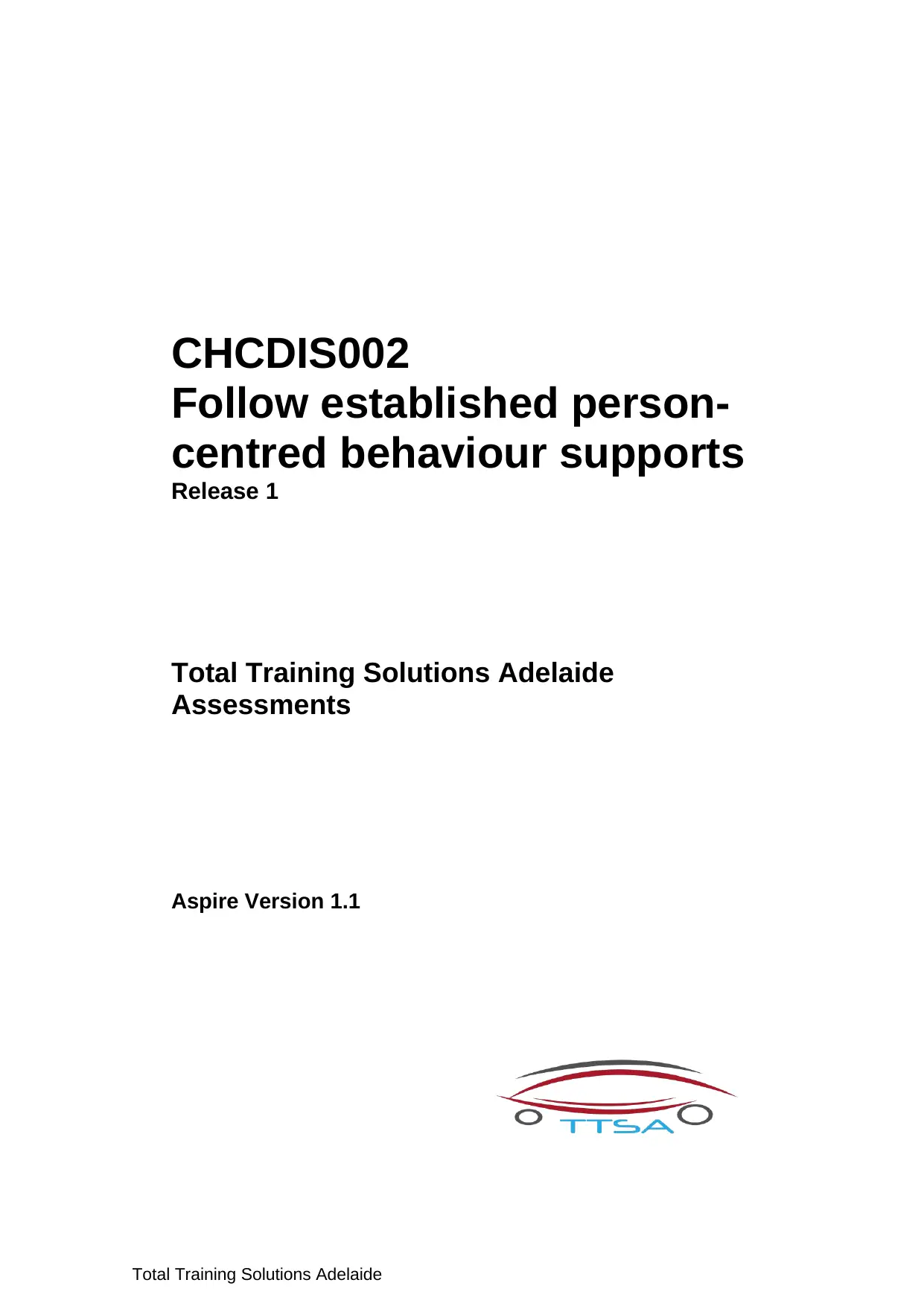
CHCDIS002
Follow established person-
centred behaviour supports
Release 1
Total Training Solutions Adelaide
Assessments
Aspire Version 1.1
Total Training Solutions Adelaide
Follow established person-
centred behaviour supports
Release 1
Total Training Solutions Adelaide
Assessments
Aspire Version 1.1
Total Training Solutions Adelaide
Paraphrase This Document
Need a fresh take? Get an instant paraphrase of this document with our AI Paraphraser
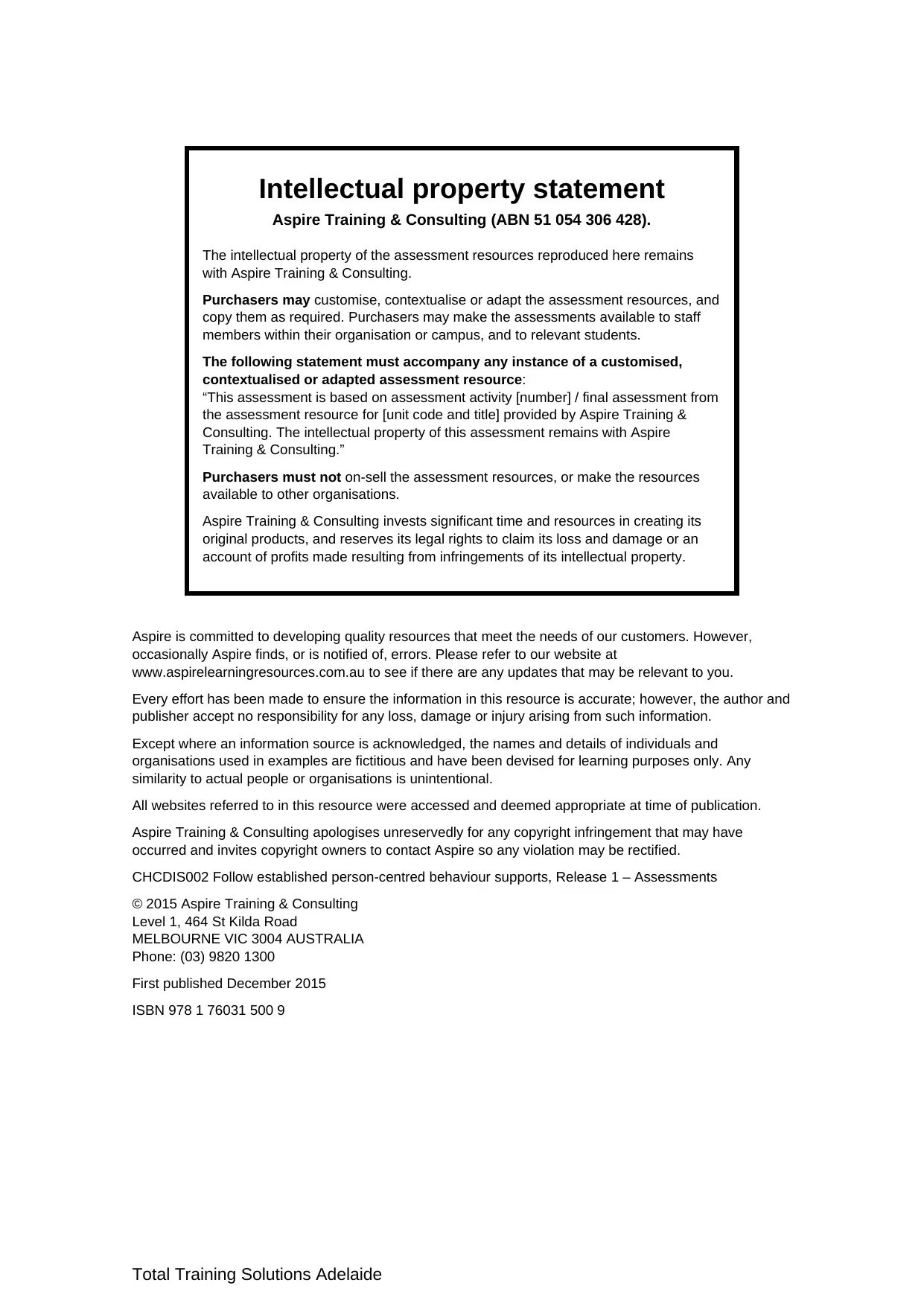
Intellectual property statement
Aspire Training & Consulting (ABN 51 054 306 428).
The intellectual property of the assessment resources reproduced here remains
with Aspire Training & Consulting.
Purchasers may customise, contextualise or adapt the assessment resources, and
copy them as required. Purchasers may make the assessments available to staff
members within their organisation or campus, and to relevant students.
The following statement must accompany any instance of a customised,
contextualised or adapted assessment resource:
“This assessment is based on assessment activity [number] / final assessment from
the assessment resource for [unit code and title] provided by Aspire Training &
Consulting. The intellectual property of this assessment remains with Aspire
Training & Consulting.”
Purchasers must not on-sell the assessment resources, or make the resources
available to other organisations.
Aspire Training & Consulting invests significant time and resources in creating its
original products, and reserves its legal rights to claim its loss and damage or an
account of profits made resulting from infringements of its intellectual property.
Aspire is committed to developing quality resources that meet the needs of our customers. However,
occasionally Aspire finds, or is notified of, errors. Please refer to our website at
www.aspirelearningresources.com.au to see if there are any updates that may be relevant to you.
Every effort has been made to ensure the information in this resource is accurate; however, the author and
publisher accept no responsibility for any loss, damage or injury arising from such information.
Except where an information source is acknowledged, the names and details of individuals and
organisations used in examples are fictitious and have been devised for learning purposes only. Any
similarity to actual people or organisations is unintentional.
All websites referred to in this resource were accessed and deemed appropriate at time of publication.
Aspire Training & Consulting apologises unreservedly for any copyright infringement that may have
occurred and invites copyright owners to contact Aspire so any violation may be rectified.
CHCDIS002 Follow established person-centred behaviour supports, Release 1 – Assessments
© 2015 Aspire Training & Consulting
Level 1, 464 St Kilda Road
MELBOURNE VIC 3004 AUSTRALIA
Phone: (03) 9820 1300
First published December 2015
ISBN 978 1 76031 500 9
Total Training Solutions Adelaide
Aspire Training & Consulting (ABN 51 054 306 428).
The intellectual property of the assessment resources reproduced here remains
with Aspire Training & Consulting.
Purchasers may customise, contextualise or adapt the assessment resources, and
copy them as required. Purchasers may make the assessments available to staff
members within their organisation or campus, and to relevant students.
The following statement must accompany any instance of a customised,
contextualised or adapted assessment resource:
“This assessment is based on assessment activity [number] / final assessment from
the assessment resource for [unit code and title] provided by Aspire Training &
Consulting. The intellectual property of this assessment remains with Aspire
Training & Consulting.”
Purchasers must not on-sell the assessment resources, or make the resources
available to other organisations.
Aspire Training & Consulting invests significant time and resources in creating its
original products, and reserves its legal rights to claim its loss and damage or an
account of profits made resulting from infringements of its intellectual property.
Aspire is committed to developing quality resources that meet the needs of our customers. However,
occasionally Aspire finds, or is notified of, errors. Please refer to our website at
www.aspirelearningresources.com.au to see if there are any updates that may be relevant to you.
Every effort has been made to ensure the information in this resource is accurate; however, the author and
publisher accept no responsibility for any loss, damage or injury arising from such information.
Except where an information source is acknowledged, the names and details of individuals and
organisations used in examples are fictitious and have been devised for learning purposes only. Any
similarity to actual people or organisations is unintentional.
All websites referred to in this resource were accessed and deemed appropriate at time of publication.
Aspire Training & Consulting apologises unreservedly for any copyright infringement that may have
occurred and invites copyright owners to contact Aspire so any violation may be rectified.
CHCDIS002 Follow established person-centred behaviour supports, Release 1 – Assessments
© 2015 Aspire Training & Consulting
Level 1, 464 St Kilda Road
MELBOURNE VIC 3004 AUSTRALIA
Phone: (03) 9820 1300
First published December 2015
ISBN 978 1 76031 500 9
Total Training Solutions Adelaide
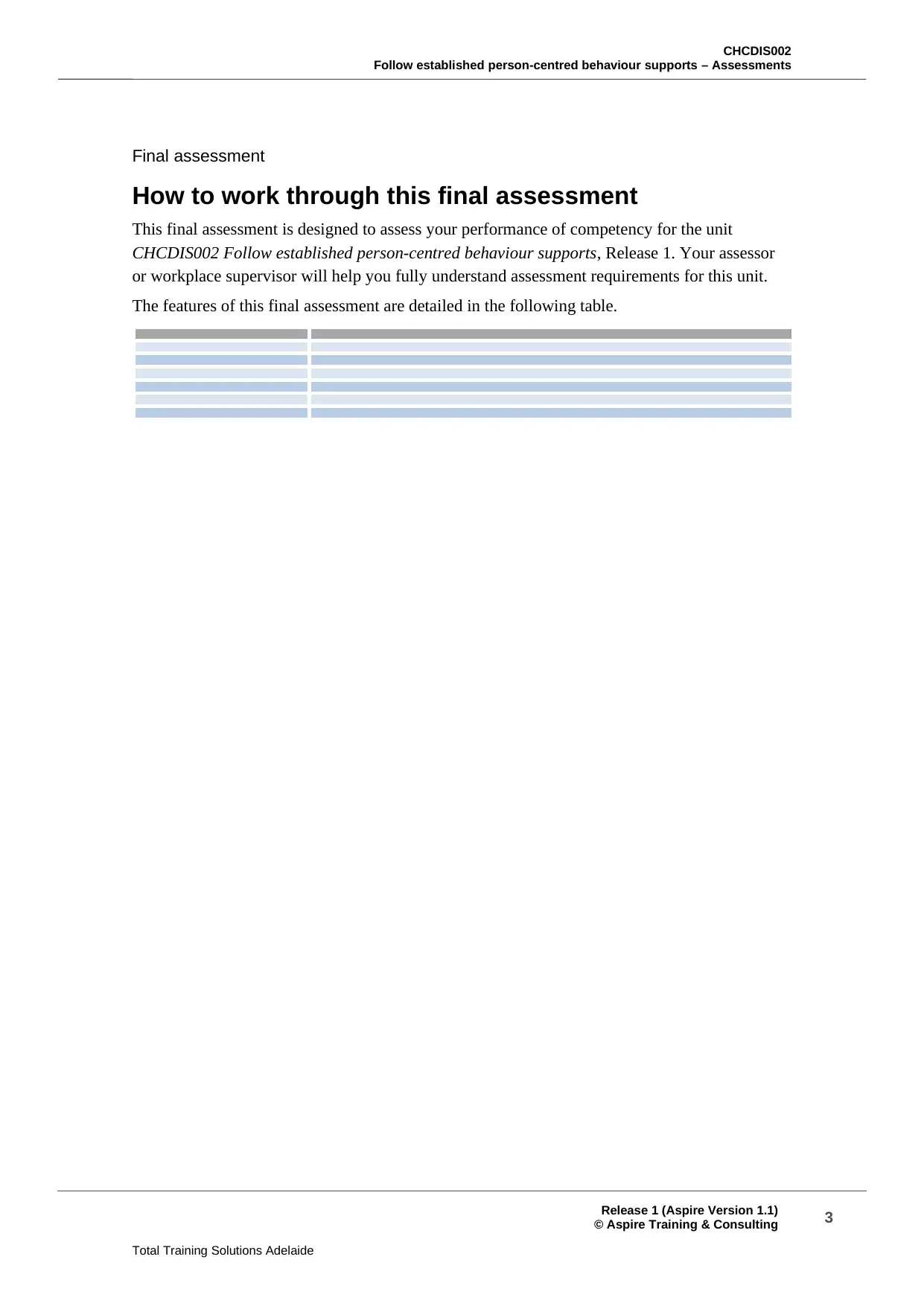
CHCDIS002
Follow established person-centred behaviour supports – Assessments
Final assessment
How to work through this final assessment
This final assessment is designed to assess your performance of competency for the unit
CHCDIS002 Follow established person-centred behaviour supports, Release 1. Your assessor
or workplace supervisor will help you fully understand assessment requirements for this unit.
The features of this final assessment are detailed in the following table.
Release 1 (Aspire Version 1.1)
© Aspire Training & Consulting 3
Total Training Solutions Adelaide
Follow established person-centred behaviour supports – Assessments
Final assessment
How to work through this final assessment
This final assessment is designed to assess your performance of competency for the unit
CHCDIS002 Follow established person-centred behaviour supports, Release 1. Your assessor
or workplace supervisor will help you fully understand assessment requirements for this unit.
The features of this final assessment are detailed in the following table.
Release 1 (Aspire Version 1.1)
© Aspire Training & Consulting 3
Total Training Solutions Adelaide
⊘ This is a preview!⊘
Do you want full access?
Subscribe today to unlock all pages.

Trusted by 1+ million students worldwide
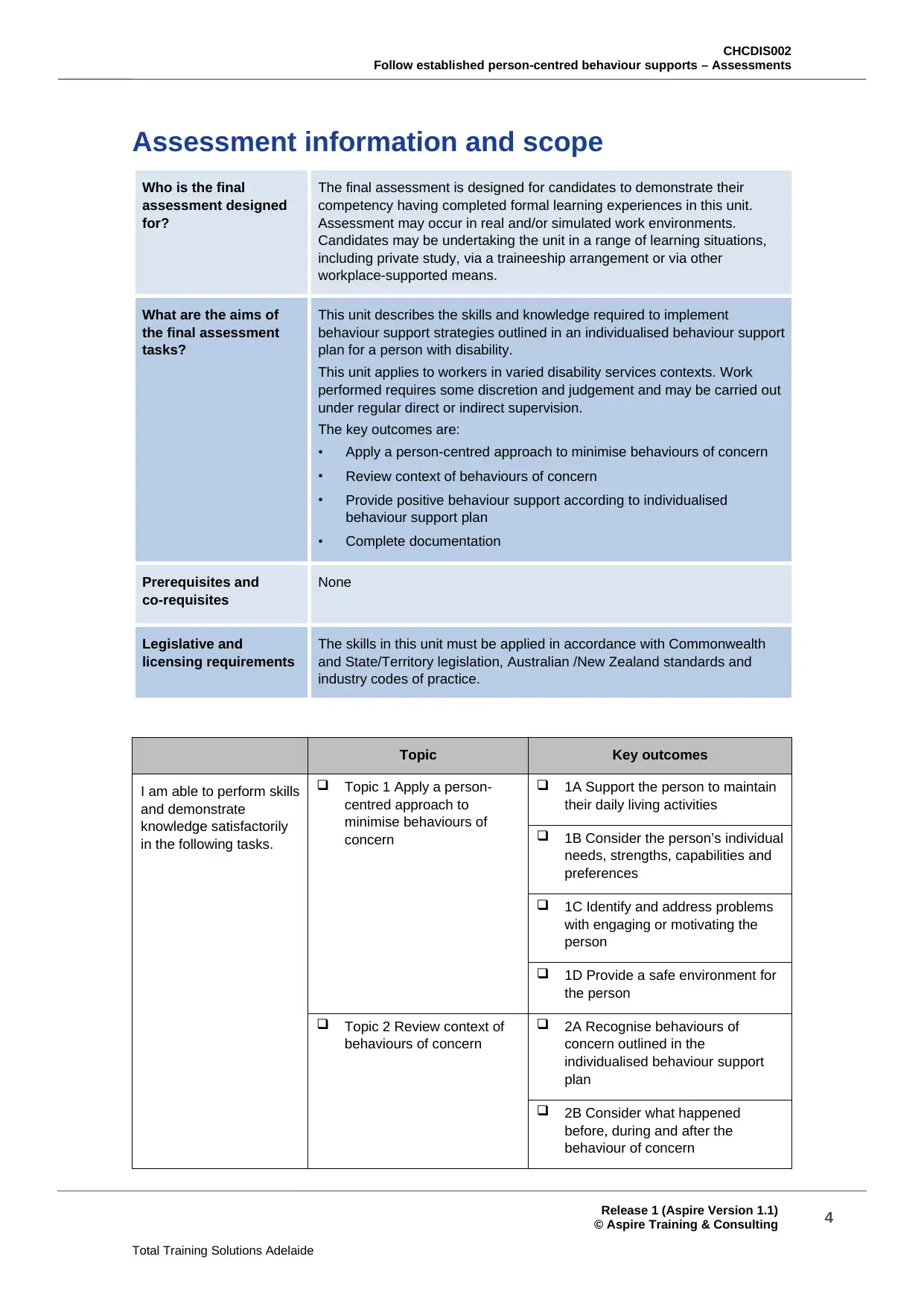
CHCDIS002
Follow established person-centred behaviour supports – Assessments
Assessment information and scope
Who is the final
assessment designed
for?
The final assessment is designed for candidates to demonstrate their
competency having completed formal learning experiences in this unit.
Assessment may occur in real and/or simulated work environments.
Candidates may be undertaking the unit in a range of learning situations,
including private study, via a traineeship arrangement or via other
workplace-supported means.
What are the aims of
the final assessment
tasks?
This unit describes the skills and knowledge required to implement
behaviour support strategies outlined in an individualised behaviour support
plan for a person with disability.
This unit applies to workers in varied disability services contexts. Work
performed requires some discretion and judgement and may be carried out
under regular direct or indirect supervision.
The key outcomes are:
• Apply a person-centred approach to minimise behaviours of concern
• Review context of behaviours of concern
• Provide positive behaviour support according to individualised
behaviour support plan
• Complete documentation
Prerequisites and
co-requisites
None
Legislative and
licensing requirements
The skills in this unit must be applied in accordance with Commonwealth
and State/Territory legislation, Australian /New Zealand standards and
industry codes of practice.
Topic Key outcomes
I am able to perform skills
and demonstrate
knowledge satisfactorily
in the following tasks.
q Topic 1 Apply a person-
centred approach to
minimise behaviours of
concern
q 1A Support the person to maintain
their daily living activities
q 1B Consider the person’s individual
needs, strengths, capabilities and
preferences
q 1C Identify and address problems
with engaging or motivating the
person
q 1D Provide a safe environment for
the person
q Topic 2 Review context of
behaviours of concern
q 2A Recognise behaviours of
concern outlined in the
individualised behaviour support
plan
q 2B Consider what happened
before, during and after the
behaviour of concern
Release 1 (Aspire Version 1.1)
© Aspire Training & Consulting 4
Total Training Solutions Adelaide
Follow established person-centred behaviour supports – Assessments
Assessment information and scope
Who is the final
assessment designed
for?
The final assessment is designed for candidates to demonstrate their
competency having completed formal learning experiences in this unit.
Assessment may occur in real and/or simulated work environments.
Candidates may be undertaking the unit in a range of learning situations,
including private study, via a traineeship arrangement or via other
workplace-supported means.
What are the aims of
the final assessment
tasks?
This unit describes the skills and knowledge required to implement
behaviour support strategies outlined in an individualised behaviour support
plan for a person with disability.
This unit applies to workers in varied disability services contexts. Work
performed requires some discretion and judgement and may be carried out
under regular direct or indirect supervision.
The key outcomes are:
• Apply a person-centred approach to minimise behaviours of concern
• Review context of behaviours of concern
• Provide positive behaviour support according to individualised
behaviour support plan
• Complete documentation
Prerequisites and
co-requisites
None
Legislative and
licensing requirements
The skills in this unit must be applied in accordance with Commonwealth
and State/Territory legislation, Australian /New Zealand standards and
industry codes of practice.
Topic Key outcomes
I am able to perform skills
and demonstrate
knowledge satisfactorily
in the following tasks.
q Topic 1 Apply a person-
centred approach to
minimise behaviours of
concern
q 1A Support the person to maintain
their daily living activities
q 1B Consider the person’s individual
needs, strengths, capabilities and
preferences
q 1C Identify and address problems
with engaging or motivating the
person
q 1D Provide a safe environment for
the person
q Topic 2 Review context of
behaviours of concern
q 2A Recognise behaviours of
concern outlined in the
individualised behaviour support
plan
q 2B Consider what happened
before, during and after the
behaviour of concern
Release 1 (Aspire Version 1.1)
© Aspire Training & Consulting 4
Total Training Solutions Adelaide
Paraphrase This Document
Need a fresh take? Get an instant paraphrase of this document with our AI Paraphraser
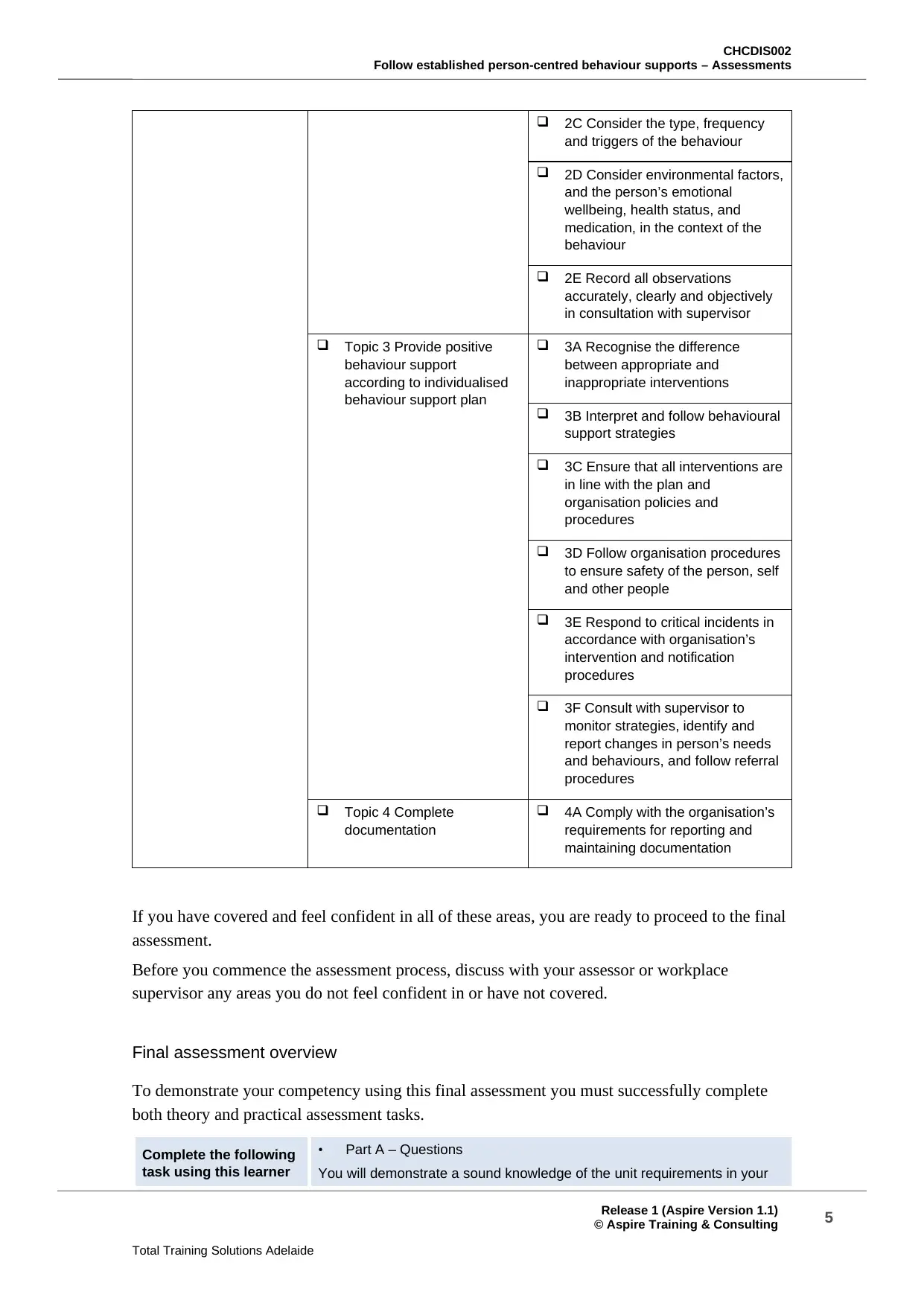
CHCDIS002
Follow established person-centred behaviour supports – Assessments
q 2C Consider the type, frequency
and triggers of the behaviour
q 2D Consider environmental factors,
and the person’s emotional
wellbeing, health status, and
medication, in the context of the
behaviour
q 2E Record all observations
accurately, clearly and objectively
in consultation with supervisor
q Topic 3 Provide positive
behaviour support
according to individualised
behaviour support plan
q 3A Recognise the difference
between appropriate and
inappropriate interventions
q 3B Interpret and follow behavioural
support strategies
q 3C Ensure that all interventions are
in line with the plan and
organisation policies and
procedures
q 3D Follow organisation procedures
to ensure safety of the person, self
and other people
q 3E Respond to critical incidents in
accordance with organisation’s
intervention and notification
procedures
q 3F Consult with supervisor to
monitor strategies, identify and
report changes in person’s needs
and behaviours, and follow referral
procedures
q Topic 4 Complete
documentation
q 4A Comply with the organisation’s
requirements for reporting and
maintaining documentation
If you have covered and feel confident in all of these areas, you are ready to proceed to the final
assessment.
Before you commence the assessment process, discuss with your assessor or workplace
supervisor any areas you do not feel confident in or have not covered.
Final assessment overview
To demonstrate your competency using this final assessment you must successfully complete
both theory and practical assessment tasks.
Complete the following
task using this learner
• Part A – Questions
You will demonstrate a sound knowledge of the unit requirements in your
Release 1 (Aspire Version 1.1)
© Aspire Training & Consulting 5
Total Training Solutions Adelaide
Follow established person-centred behaviour supports – Assessments
q 2C Consider the type, frequency
and triggers of the behaviour
q 2D Consider environmental factors,
and the person’s emotional
wellbeing, health status, and
medication, in the context of the
behaviour
q 2E Record all observations
accurately, clearly and objectively
in consultation with supervisor
q Topic 3 Provide positive
behaviour support
according to individualised
behaviour support plan
q 3A Recognise the difference
between appropriate and
inappropriate interventions
q 3B Interpret and follow behavioural
support strategies
q 3C Ensure that all interventions are
in line with the plan and
organisation policies and
procedures
q 3D Follow organisation procedures
to ensure safety of the person, self
and other people
q 3E Respond to critical incidents in
accordance with organisation’s
intervention and notification
procedures
q 3F Consult with supervisor to
monitor strategies, identify and
report changes in person’s needs
and behaviours, and follow referral
procedures
q Topic 4 Complete
documentation
q 4A Comply with the organisation’s
requirements for reporting and
maintaining documentation
If you have covered and feel confident in all of these areas, you are ready to proceed to the final
assessment.
Before you commence the assessment process, discuss with your assessor or workplace
supervisor any areas you do not feel confident in or have not covered.
Final assessment overview
To demonstrate your competency using this final assessment you must successfully complete
both theory and practical assessment tasks.
Complete the following
task using this learner
• Part A – Questions
You will demonstrate a sound knowledge of the unit requirements in your
Release 1 (Aspire Version 1.1)
© Aspire Training & Consulting 5
Total Training Solutions Adelaide

CHCDIS002
Follow established person-centred behaviour supports – Assessments
guide responses.
• Part B – Case study questions
You will demonstrate a sound knowledge of the unit requirements in your
responses.
Refer to the Aspire
Practical placement
logbook for this unit
• Practical placement
Your performance will be assessed in the workplace.
Release 1 (Aspire Version 1.1)
© Aspire Training & Consulting 6
Total Training Solutions Adelaide
Follow established person-centred behaviour supports – Assessments
guide responses.
• Part B – Case study questions
You will demonstrate a sound knowledge of the unit requirements in your
responses.
Refer to the Aspire
Practical placement
logbook for this unit
• Practical placement
Your performance will be assessed in the workplace.
Release 1 (Aspire Version 1.1)
© Aspire Training & Consulting 6
Total Training Solutions Adelaide
⊘ This is a preview!⊘
Do you want full access?
Subscribe today to unlock all pages.

Trusted by 1+ million students worldwide
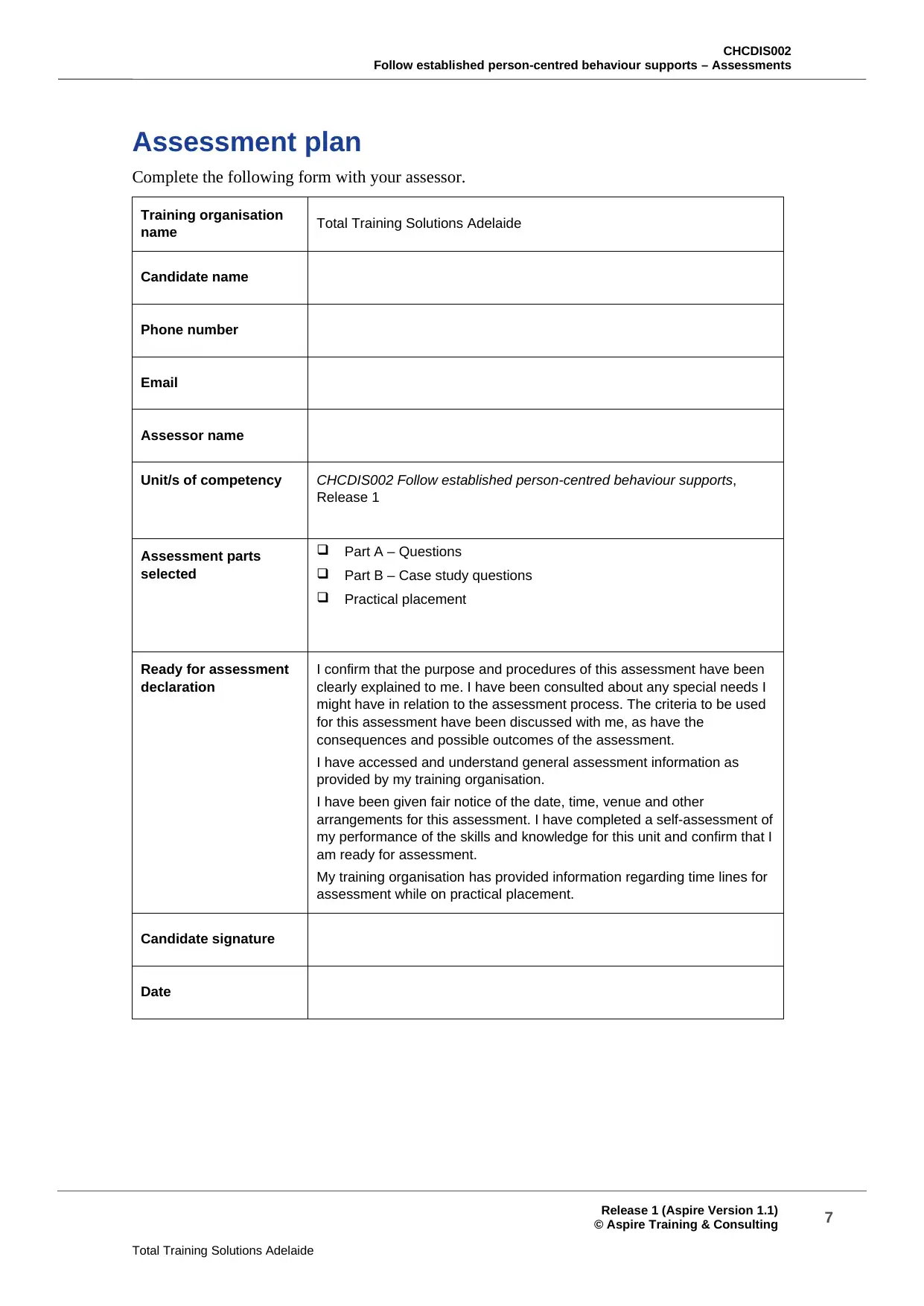
CHCDIS002
Follow established person-centred behaviour supports – Assessments
Assessment plan
Complete the following form with your assessor.
Training organisation
name Total Training Solutions Adelaide
Candidate name
Phone number
Email
Assessor name
Unit/s of competency CHCDIS002 Follow established person-centred behaviour supports,
Release 1
Assessment parts
selected
q Part A – Questions
q Part B – Case study questions
q Practical placement
Ready for assessment
declaration
I confirm that the purpose and procedures of this assessment have been
clearly explained to me. I have been consulted about any special needs I
might have in relation to the assessment process. The criteria to be used
for this assessment have been discussed with me, as have the
consequences and possible outcomes of the assessment.
I have accessed and understand general assessment information as
provided by my training organisation.
I have been given fair notice of the date, time, venue and other
arrangements for this assessment. I have completed a self-assessment of
my performance of the skills and knowledge for this unit and confirm that I
am ready for assessment.
My training organisation has provided information regarding time lines for
assessment while on practical placement.
Candidate signature
Date
Release 1 (Aspire Version 1.1)
© Aspire Training & Consulting 7
Total Training Solutions Adelaide
Follow established person-centred behaviour supports – Assessments
Assessment plan
Complete the following form with your assessor.
Training organisation
name Total Training Solutions Adelaide
Candidate name
Phone number
Assessor name
Unit/s of competency CHCDIS002 Follow established person-centred behaviour supports,
Release 1
Assessment parts
selected
q Part A – Questions
q Part B – Case study questions
q Practical placement
Ready for assessment
declaration
I confirm that the purpose and procedures of this assessment have been
clearly explained to me. I have been consulted about any special needs I
might have in relation to the assessment process. The criteria to be used
for this assessment have been discussed with me, as have the
consequences and possible outcomes of the assessment.
I have accessed and understand general assessment information as
provided by my training organisation.
I have been given fair notice of the date, time, venue and other
arrangements for this assessment. I have completed a self-assessment of
my performance of the skills and knowledge for this unit and confirm that I
am ready for assessment.
My training organisation has provided information regarding time lines for
assessment while on practical placement.
Candidate signature
Date
Release 1 (Aspire Version 1.1)
© Aspire Training & Consulting 7
Total Training Solutions Adelaide
Paraphrase This Document
Need a fresh take? Get an instant paraphrase of this document with our AI Paraphraser
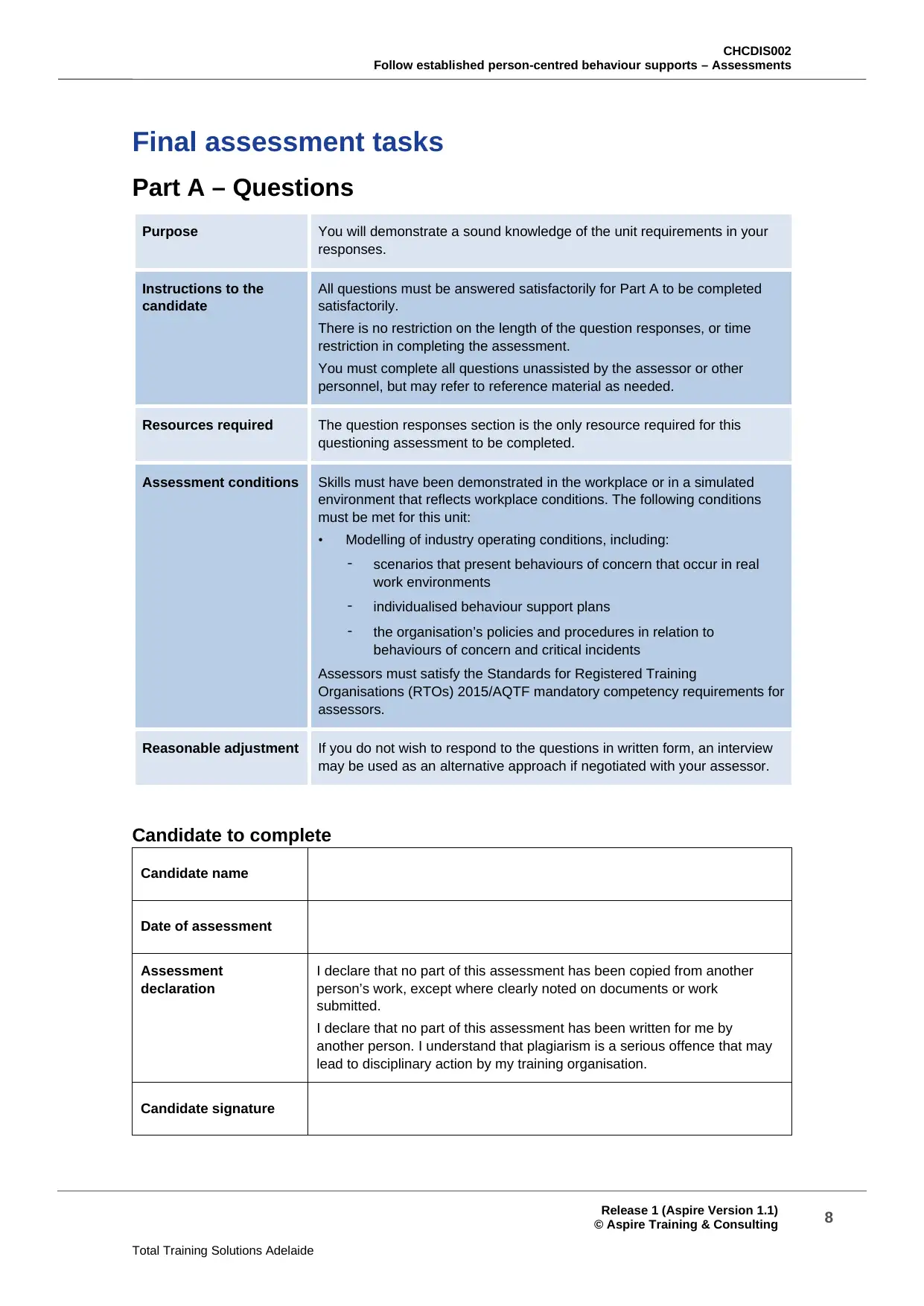
CHCDIS002
Follow established person-centred behaviour supports – Assessments
Final assessment tasks
Part A – Questions
Purpose You will demonstrate a sound knowledge of the unit requirements in your
responses.
Instructions to the
candidate
All questions must be answered satisfactorily for Part A to be completed
satisfactorily.
There is no restriction on the length of the question responses, or time
restriction in completing the assessment.
You must complete all questions unassisted by the assessor or other
personnel, but may refer to reference material as needed.
Resources required The question responses section is the only resource required for this
questioning assessment to be completed.
Assessment conditions Skills must have been demonstrated in the workplace or in a simulated
environment that reflects workplace conditions. The following conditions
must be met for this unit:
• Modelling of industry operating conditions, including:
- scenarios that present behaviours of concern that occur in real
work environments
- individualised behaviour support plans
- the organisation’s policies and procedures in relation to
behaviours of concern and critical incidents
Assessors must satisfy the Standards for Registered Training
Organisations (RTOs) 2015/AQTF mandatory competency requirements for
assessors.
Reasonable adjustment If you do not wish to respond to the questions in written form, an interview
may be used as an alternative approach if negotiated with your assessor.
Candidate to complete
Candidate name
Date of assessment
Assessment
declaration
I declare that no part of this assessment has been copied from another
person’s work, except where clearly noted on documents or work
submitted.
I declare that no part of this assessment has been written for me by
another person. I understand that plagiarism is a serious offence that may
lead to disciplinary action by my training organisation.
Candidate signature
Release 1 (Aspire Version 1.1)
© Aspire Training & Consulting 8
Total Training Solutions Adelaide
Follow established person-centred behaviour supports – Assessments
Final assessment tasks
Part A – Questions
Purpose You will demonstrate a sound knowledge of the unit requirements in your
responses.
Instructions to the
candidate
All questions must be answered satisfactorily for Part A to be completed
satisfactorily.
There is no restriction on the length of the question responses, or time
restriction in completing the assessment.
You must complete all questions unassisted by the assessor or other
personnel, but may refer to reference material as needed.
Resources required The question responses section is the only resource required for this
questioning assessment to be completed.
Assessment conditions Skills must have been demonstrated in the workplace or in a simulated
environment that reflects workplace conditions. The following conditions
must be met for this unit:
• Modelling of industry operating conditions, including:
- scenarios that present behaviours of concern that occur in real
work environments
- individualised behaviour support plans
- the organisation’s policies and procedures in relation to
behaviours of concern and critical incidents
Assessors must satisfy the Standards for Registered Training
Organisations (RTOs) 2015/AQTF mandatory competency requirements for
assessors.
Reasonable adjustment If you do not wish to respond to the questions in written form, an interview
may be used as an alternative approach if negotiated with your assessor.
Candidate to complete
Candidate name
Date of assessment
Assessment
declaration
I declare that no part of this assessment has been copied from another
person’s work, except where clearly noted on documents or work
submitted.
I declare that no part of this assessment has been written for me by
another person. I understand that plagiarism is a serious offence that may
lead to disciplinary action by my training organisation.
Candidate signature
Release 1 (Aspire Version 1.1)
© Aspire Training & Consulting 8
Total Training Solutions Adelaide
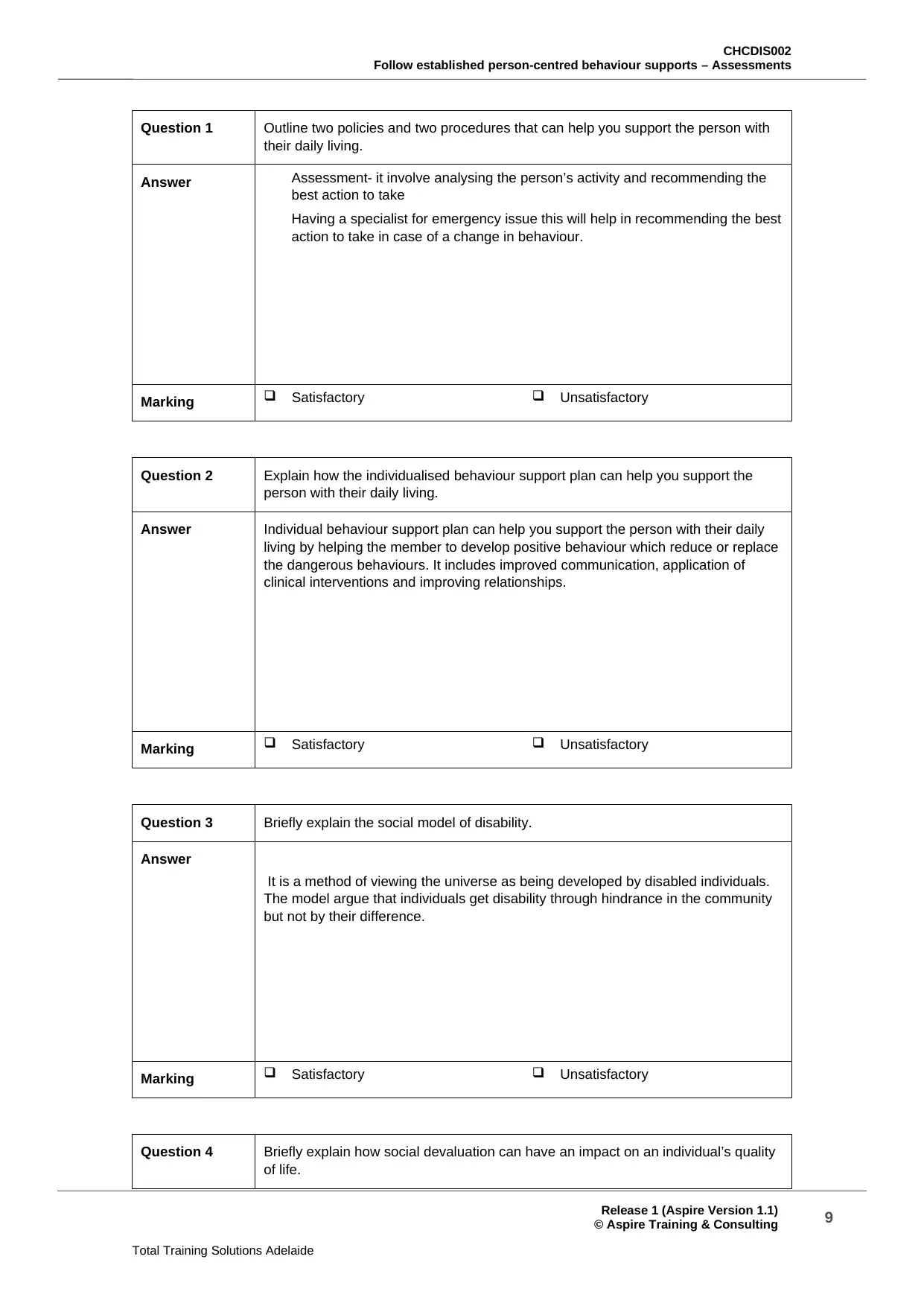
CHCDIS002
Follow established person-centred behaviour supports – Assessments
Question 1 Outline two policies and two procedures that can help you support the person with
their daily living.
Answer Assessment- it involve analysing the person’s activity and recommending the
best action to take
Having a specialist for emergency issue this will help in recommending the best
action to take in case of a change in behaviour.
Marking q Satisfactory q Unsatisfactory
Question 2 Explain how the individualised behaviour support plan can help you support the
person with their daily living.
Answer Individual behaviour support plan can help you support the person with their daily
living by helping the member to develop positive behaviour which reduce or replace
the dangerous behaviours. It includes improved communication, application of
clinical interventions and improving relationships.
Marking q Satisfactory q Unsatisfactory
Question 3 Briefly explain the social model of disability.
Answer
It is a method of viewing the universe as being developed by disabled individuals.
The model argue that individuals get disability through hindrance in the community
but not by their difference.
Marking q Satisfactory q Unsatisfactory
Question 4 Briefly explain how social devaluation can have an impact on an individual’s quality
of life.
Release 1 (Aspire Version 1.1)
© Aspire Training & Consulting 9
Total Training Solutions Adelaide
Follow established person-centred behaviour supports – Assessments
Question 1 Outline two policies and two procedures that can help you support the person with
their daily living.
Answer Assessment- it involve analysing the person’s activity and recommending the
best action to take
Having a specialist for emergency issue this will help in recommending the best
action to take in case of a change in behaviour.
Marking q Satisfactory q Unsatisfactory
Question 2 Explain how the individualised behaviour support plan can help you support the
person with their daily living.
Answer Individual behaviour support plan can help you support the person with their daily
living by helping the member to develop positive behaviour which reduce or replace
the dangerous behaviours. It includes improved communication, application of
clinical interventions and improving relationships.
Marking q Satisfactory q Unsatisfactory
Question 3 Briefly explain the social model of disability.
Answer
It is a method of viewing the universe as being developed by disabled individuals.
The model argue that individuals get disability through hindrance in the community
but not by their difference.
Marking q Satisfactory q Unsatisfactory
Question 4 Briefly explain how social devaluation can have an impact on an individual’s quality
of life.
Release 1 (Aspire Version 1.1)
© Aspire Training & Consulting 9
Total Training Solutions Adelaide
⊘ This is a preview!⊘
Do you want full access?
Subscribe today to unlock all pages.

Trusted by 1+ million students worldwide
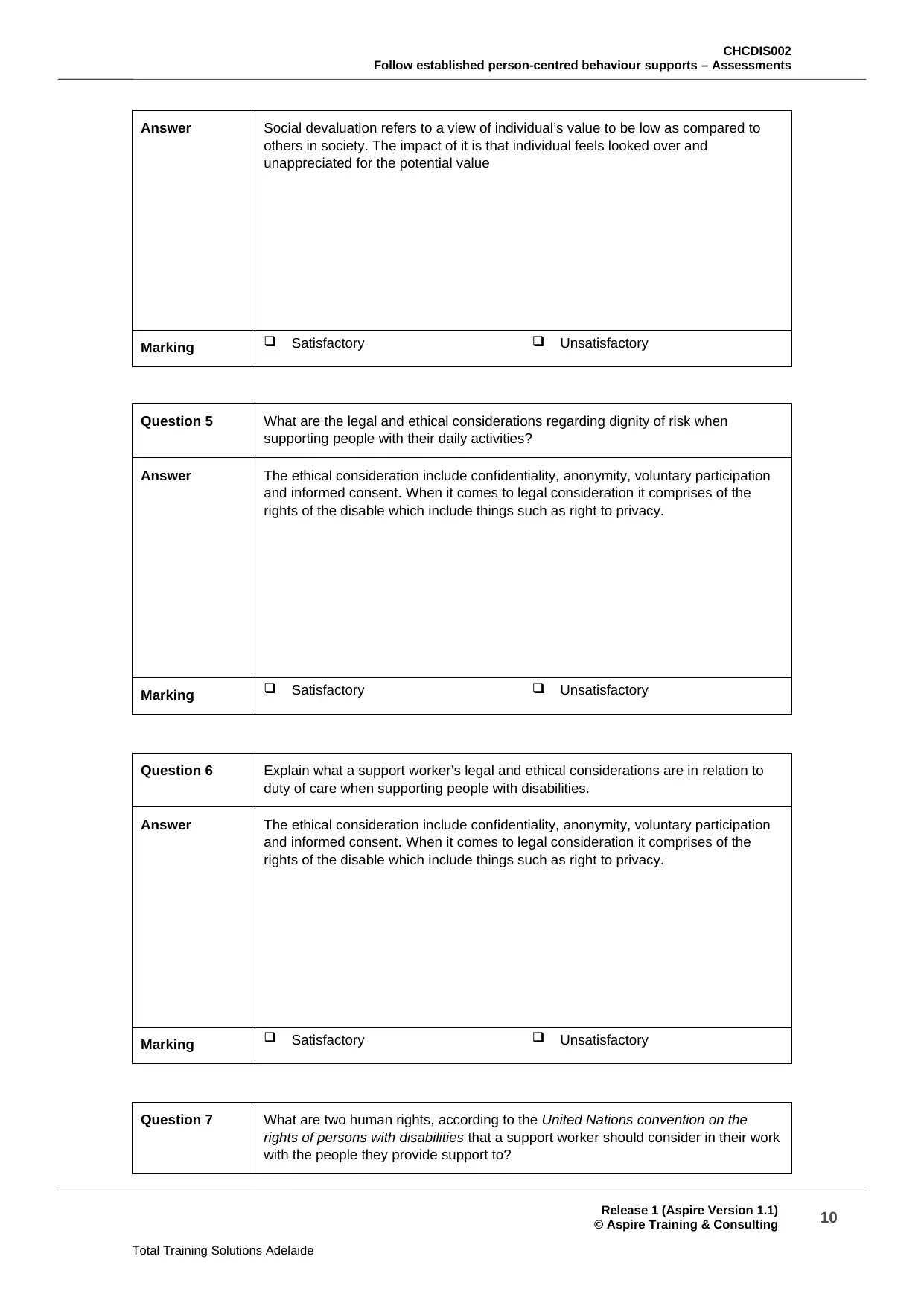
CHCDIS002
Follow established person-centred behaviour supports – Assessments
Answer Social devaluation refers to a view of individual’s value to be low as compared to
others in society. The impact of it is that individual feels looked over and
unappreciated for the potential value
Marking q Satisfactory q Unsatisfactory
Question 5 What are the legal and ethical considerations regarding dignity of risk when
supporting people with their daily activities?
Answer The ethical consideration include confidentiality, anonymity, voluntary participation
and informed consent. When it comes to legal consideration it comprises of the
rights of the disable which include things such as right to privacy.
Marking q Satisfactory q Unsatisfactory
Question 6 Explain what a support worker’s legal and ethical considerations are in relation to
duty of care when supporting people with disabilities.
Answer The ethical consideration include confidentiality, anonymity, voluntary participation
and informed consent. When it comes to legal consideration it comprises of the
rights of the disable which include things such as right to privacy.
Marking q Satisfactory q Unsatisfactory
Question 7 What are two human rights, according to the United Nations convention on the
rights of persons with disabilities that a support worker should consider in their work
with the people they provide support to?
Release 1 (Aspire Version 1.1)
© Aspire Training & Consulting 10
Total Training Solutions Adelaide
Follow established person-centred behaviour supports – Assessments
Answer Social devaluation refers to a view of individual’s value to be low as compared to
others in society. The impact of it is that individual feels looked over and
unappreciated for the potential value
Marking q Satisfactory q Unsatisfactory
Question 5 What are the legal and ethical considerations regarding dignity of risk when
supporting people with their daily activities?
Answer The ethical consideration include confidentiality, anonymity, voluntary participation
and informed consent. When it comes to legal consideration it comprises of the
rights of the disable which include things such as right to privacy.
Marking q Satisfactory q Unsatisfactory
Question 6 Explain what a support worker’s legal and ethical considerations are in relation to
duty of care when supporting people with disabilities.
Answer The ethical consideration include confidentiality, anonymity, voluntary participation
and informed consent. When it comes to legal consideration it comprises of the
rights of the disable which include things such as right to privacy.
Marking q Satisfactory q Unsatisfactory
Question 7 What are two human rights, according to the United Nations convention on the
rights of persons with disabilities that a support worker should consider in their work
with the people they provide support to?
Release 1 (Aspire Version 1.1)
© Aspire Training & Consulting 10
Total Training Solutions Adelaide
Paraphrase This Document
Need a fresh take? Get an instant paraphrase of this document with our AI Paraphraser
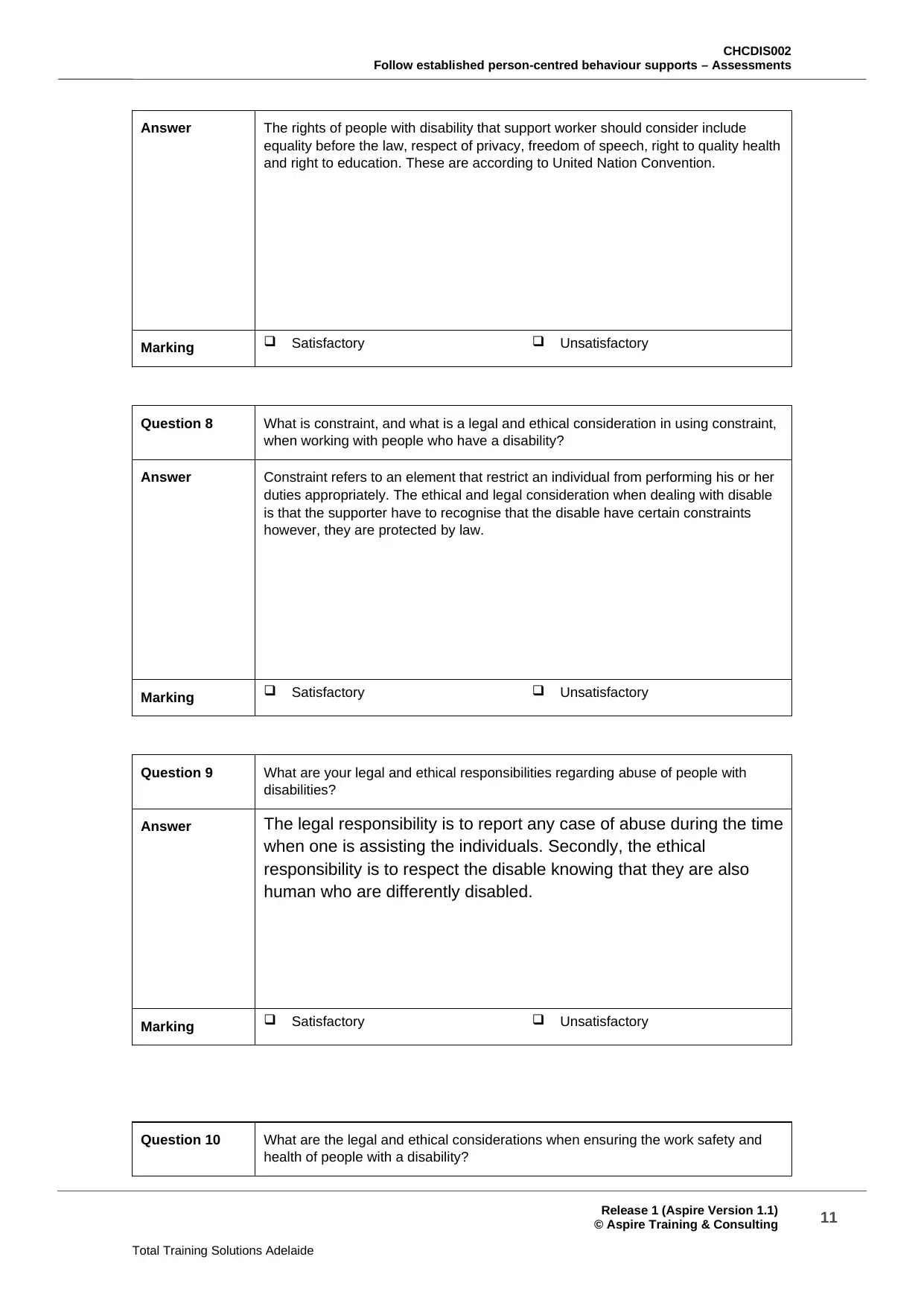
CHCDIS002
Follow established person-centred behaviour supports – Assessments
Answer The rights of people with disability that support worker should consider include
equality before the law, respect of privacy, freedom of speech, right to quality health
and right to education. These are according to United Nation Convention.
Marking q Satisfactory q Unsatisfactory
Question 8 What is constraint, and what is a legal and ethical consideration in using constraint,
when working with people who have a disability?
Answer Constraint refers to an element that restrict an individual from performing his or her
duties appropriately. The ethical and legal consideration when dealing with disable
is that the supporter have to recognise that the disable have certain constraints
however, they are protected by law.
Marking q Satisfactory q Unsatisfactory
Question 9 What are your legal and ethical responsibilities regarding abuse of people with
disabilities?
Answer The legal responsibility is to report any case of abuse during the time
when one is assisting the individuals. Secondly, the ethical
responsibility is to respect the disable knowing that they are also
human who are differently disabled.
Marking q Satisfactory q Unsatisfactory
Question 10 What are the legal and ethical considerations when ensuring the work safety and
health of people with a disability?
Release 1 (Aspire Version 1.1)
© Aspire Training & Consulting 11
Total Training Solutions Adelaide
Follow established person-centred behaviour supports – Assessments
Answer The rights of people with disability that support worker should consider include
equality before the law, respect of privacy, freedom of speech, right to quality health
and right to education. These are according to United Nation Convention.
Marking q Satisfactory q Unsatisfactory
Question 8 What is constraint, and what is a legal and ethical consideration in using constraint,
when working with people who have a disability?
Answer Constraint refers to an element that restrict an individual from performing his or her
duties appropriately. The ethical and legal consideration when dealing with disable
is that the supporter have to recognise that the disable have certain constraints
however, they are protected by law.
Marking q Satisfactory q Unsatisfactory
Question 9 What are your legal and ethical responsibilities regarding abuse of people with
disabilities?
Answer The legal responsibility is to report any case of abuse during the time
when one is assisting the individuals. Secondly, the ethical
responsibility is to respect the disable knowing that they are also
human who are differently disabled.
Marking q Satisfactory q Unsatisfactory
Question 10 What are the legal and ethical considerations when ensuring the work safety and
health of people with a disability?
Release 1 (Aspire Version 1.1)
© Aspire Training & Consulting 11
Total Training Solutions Adelaide
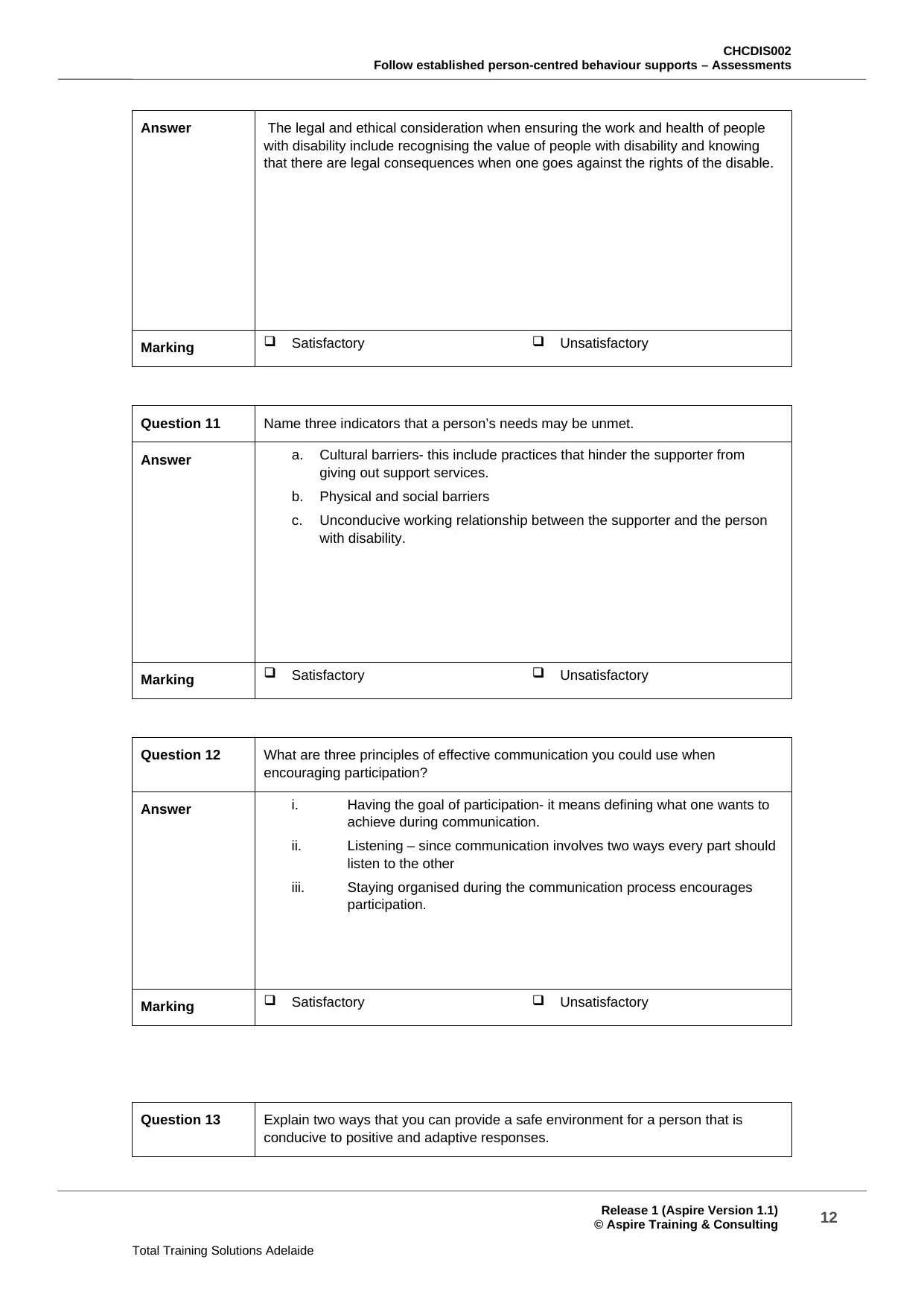
CHCDIS002
Follow established person-centred behaviour supports – Assessments
Answer The legal and ethical consideration when ensuring the work and health of people
with disability include recognising the value of people with disability and knowing
that there are legal consequences when one goes against the rights of the disable.
Marking q Satisfactory q Unsatisfactory
Question 11 Name three indicators that a person’s needs may be unmet.
Answer a. Cultural barriers- this include practices that hinder the supporter from
giving out support services.
b. Physical and social barriers
c. Unconducive working relationship between the supporter and the person
with disability.
Marking q Satisfactory q Unsatisfactory
Question 12 What are three principles of effective communication you could use when
encouraging participation?
Answer i. Having the goal of participation- it means defining what one wants to
achieve during communication.
ii. Listening – since communication involves two ways every part should
listen to the other
iii. Staying organised during the communication process encourages
participation.
Marking q Satisfactory q Unsatisfactory
Question 13 Explain two ways that you can provide a safe environment for a person that is
conducive to positive and adaptive responses.
Release 1 (Aspire Version 1.1)
© Aspire Training & Consulting 12
Total Training Solutions Adelaide
Follow established person-centred behaviour supports – Assessments
Answer The legal and ethical consideration when ensuring the work and health of people
with disability include recognising the value of people with disability and knowing
that there are legal consequences when one goes against the rights of the disable.
Marking q Satisfactory q Unsatisfactory
Question 11 Name three indicators that a person’s needs may be unmet.
Answer a. Cultural barriers- this include practices that hinder the supporter from
giving out support services.
b. Physical and social barriers
c. Unconducive working relationship between the supporter and the person
with disability.
Marking q Satisfactory q Unsatisfactory
Question 12 What are three principles of effective communication you could use when
encouraging participation?
Answer i. Having the goal of participation- it means defining what one wants to
achieve during communication.
ii. Listening – since communication involves two ways every part should
listen to the other
iii. Staying organised during the communication process encourages
participation.
Marking q Satisfactory q Unsatisfactory
Question 13 Explain two ways that you can provide a safe environment for a person that is
conducive to positive and adaptive responses.
Release 1 (Aspire Version 1.1)
© Aspire Training & Consulting 12
Total Training Solutions Adelaide
⊘ This is a preview!⊘
Do you want full access?
Subscribe today to unlock all pages.

Trusted by 1+ million students worldwide
1 out of 30
Related Documents
Your All-in-One AI-Powered Toolkit for Academic Success.
+13062052269
info@desklib.com
Available 24*7 on WhatsApp / Email
![[object Object]](/_next/static/media/star-bottom.7253800d.svg)
Unlock your academic potential
Copyright © 2020–2026 A2Z Services. All Rights Reserved. Developed and managed by ZUCOL.





